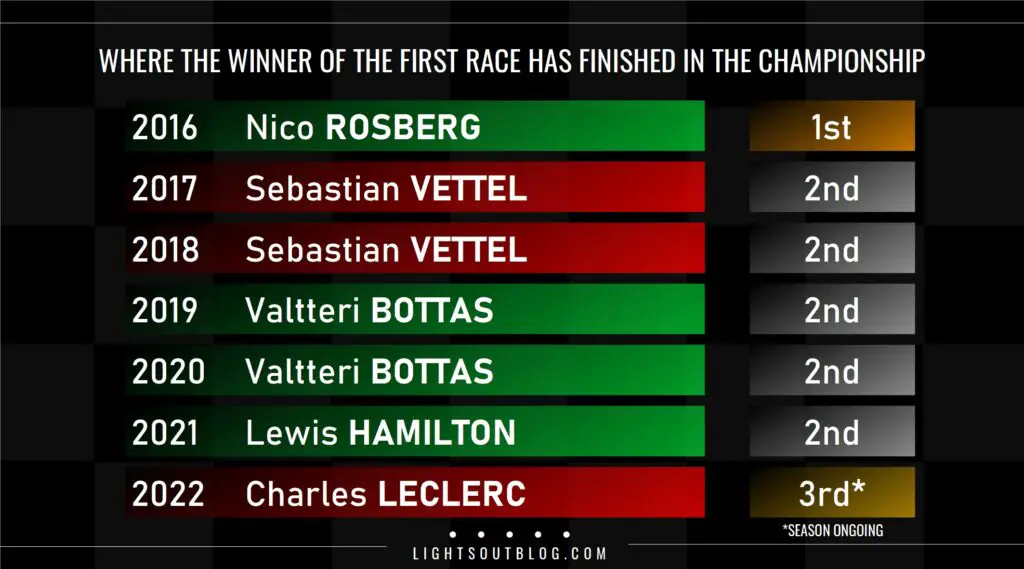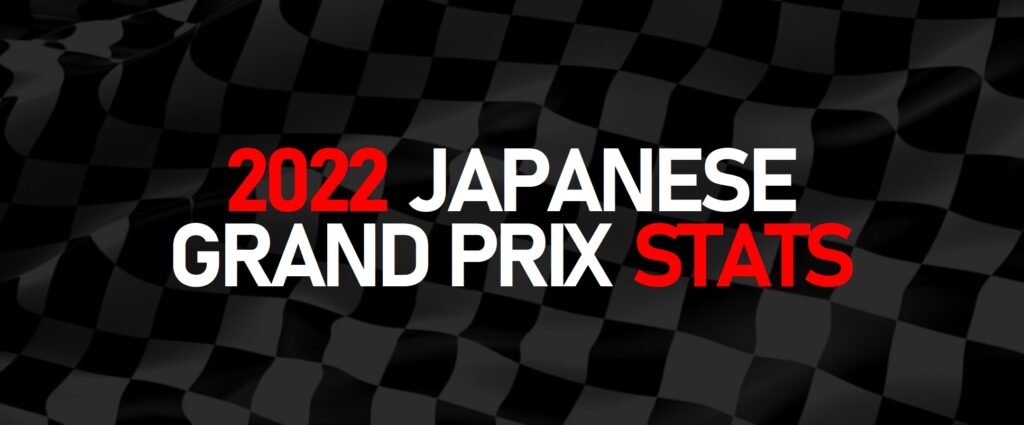Verstappen secures his second title, Red Bull set a personal best for most 1-2 finishes in a season and Latifi picks up his first points of the season. Here are the facts and statistics from the 2022 Japanese Grand Prix!
VERSTAPPEN WINS HIS SECOND TITLE
Max Verstappen clinched his second title as a result of his victory in the 2022 Japanese Grand Prix.
Verstappen won his second title with Red Bull at Suzuka 11 years to the day since Sebastian Vettel won his second title with Red Bull at Suzuka. Verstappen becomes Formula 1’s second-youngest double World Champion. Only Vettel won his second title at a younger age.
Verstappen became the fourth driver to have won the title with four or more races remaining in the season. Nigel Mansell (1992), Michael Schumacher (2001, 2002, 2004) and Sebastian Vettel (2011) are the only other drivers to have achieved the feat.
This was the 12th time that the title was decided at Suzuka. The circuit therefore overtakes Monza as the circuit at which the most title deciders have been held. Monza had held or shared the record since 1961.
Japan extended its record as the country to have had the most title deciding races. This was the 14th time that the title has been decided in Japan. In addition to the 12 titles won at Suzuka, James Hunt won the title at the 1976 Japanese Grand Prix held at Fuji Speedway, while Michael Schumacher clinched his second title at the 1995 Pacific Grand Prix, which was held at TI Circuit Aida.
Verstappen is the eighth driver to win the title at Suzuka after Nelson Piquet, Ayrton Senna, Alain Prost, Damon Hill, Mika Hakkinen, Michael Schumacher and Sebastian Vettel.

Verstappen’s title win makes this the sixth season in a row in which the driver who won the first race of the season has failed to win that year’s championship. Charles Leclerc won the season-opening Bahrain Grand Prix this year.
VICTORY FOR VERSTAPPEN AT THE 2022 JAPANESE GRAND PRIX
Max Verstappen secured the 32nd victory of his career at the 2022 Japanese Grand Prix. He overtakes Nigel Mansell and equals Fernando Alonso for sixth place in the all-time list of most Formula 1 wins.
Verstappen made this the seventh consecutive win for Red Bull. It’s the second time in their history that the team have won seven races in a row, having last done so towards the end of the 2013 season. It’s the 15th occasion that a team have taken seven or more successive wins.
Verstappen won the race by 27.066 seconds, the largest win margin since the 2021 Russian Grand Prix and the largest win margin ever seen at the Suzuka circuit.
Verstappen becomes the 17th different driver to have won a race at Suzuka since the circuit joined the F1 calendar in 1987. This was Red Bull’s fifth win at the venue.
Verstappen became the eighth driver to record four or more podium finishes at Suzuka.
ON THE PODIUM IN JAPAN
Sergio Perez finished as runner-up in the 2022 Japanese Grand Prix, recording his first-ever top six result at Suzuka. This was Perez’s 24th podium finish, equalling the career tallies of Stirling Moss, John Surtees and Alain Jones.
With Max Verstappen winning and Perez runner-up, Red Bull recorded their 22nd 1-2 finish. This was the team’s fifth 1-2 result of the year. It’s the first time the team have recorded five 1-2 finishes in a single season.
This was Red Bull’s third 1-2 finish at Suzuka, after 2010 and 2013. They equal Mercedes as the team to have taken the most 1-2 results at the circuit.
With Red Bull scoring 43 points, they became the first team to have scored 300 points in total at the Japanese Grand Prix.
Charles Leclerc finished in third place, recording his fourth consecutive podium finish. That equals the longest podium streak of Leclerc’s career. He last finished on the podium at four races in a row between the 2019 Canadian and British Grands Prix.
Leclerc recorded his 22nd top three finish, equalling Rene Arnoux for 49th in the all-time list of most podiums.
This was the 20th podium finish for a Ferrari driver at Suzuka.
IN THE POINTS AT SUZUKA
With fourth place, Esteban Ocon recorded his best result of the 2022 season to date. He last finished in the top four at the 2021 Saudi Arabian Grand Prix. This was Ocon’s third consecutive visit to Suzuka in which he picked up points.
Lewis Hamilton finished in fifth place, failing to finish on the podium at the Japanese Grand Prix for the first time since 2013. This was the first Suzuzka race which Mercedes failed to win in the V6 hybrid era.
Despite spinning on the opening lap, Sebastian Vettel equalled his best result of the season with sixth place. He fended off Fernando Alonso to finish ahead of the Spaniard by just 0.011 seconds. Aside from his retirement in 2017, Vettel has never finished outside of the top six on any of the 11 occasions on which he has crossed the finish line at Suzuka.
With sixth place, Vettel equalled the Silverstone-based team’s best result at Suzuka in the last 16 Japanese Grands Prix held at the track.
Fernando Alonso finished in seventh place, recording the 279th finish of his career. He sets a new record as the driver to have crossed the finish line on the most occasions in Formula 1. This was the first time Alonso scored points at Suzuka since 2013.
Alonso was the only driver other than Verstappen to lead a lap in the Japanese Grand Prix. This was the first time Alonso has led a lap at a circuit other than the Hungaroring since leading five laps in the 2014 Austrian Grand Prix. This was the first time since 2011 that Alonso led a lap at Suzuka.
This was the first time in his 16 appearances at Suzuka that Alonso has finished in the same position as he started.
With both Ocon and Alonso scoring, this was the first time both of the Enstone team’s cars have scored points at the Japanese Grand Prix since the team was under its Lotus guise in 2015.
George Russell finished the 2022 Japanese Grand Prix in eighth place. This was the first time Russell has finished two consecutive races outside of the top five during his time at the Mercedes team.
Nicholas Latifi scored his first points of the season with ninth place. This was the third time Latifi has scored in his F1 career – the first time he has done so since the 2021 Belgian Grand Prix. Latifi has only ever scored in rain-affected races. His only other points-scoring appearance came at the 2021 Hungarian Grand Prix.
Latifi is one of only two drivers to have scored on every visit to Suzuka. The only other driver to have done so is Cristiano da Matta, who finished seventh on his only start at the circuit with Toyota in 2003.
Latifi recorded Williams’ best Japanese Grand Prix result since 2015.
Latifi became the first driver to score a point from 19th on the grid at Suzuka since Martin Brundle, who finished fifth in 1991.
A tenth place finish saw Lando Norris score for the first time at Suzuka.
THE OTHER FINISHERS
Daniel Ricciardo finished in 11th place, recording his first finish outside of the top ten at Suzuka since 2015. It’s worth noting that he finished in the top ten before being disqualified in the previous race at the track in 2019.
With Mick Schumacher and Kevin Magnussen finishing the race in 17th and 14th respectively, this was the sixth consecutive race at which both Haas drivers have finished without scoring points.
Valtteri Bottas finished 15th, failing to score at the Japanese Grand Prix for the first time since his maiden season in 2013.
Zhou Guanyu recorded the fastest lap of the race for the first time in his career. He becomes the 136th driver to set the fastest lap in a World Championship race. It was the first fastest lap for the Alfa Romeo marque since Andrea de Cesaris set the fastest lap in the 1983 Belgian Grand Prix and the first fastest lap for the former Sauber team since the 2013 Spanish Grand Prix.
With neither Bottas or Zhou scoring a point, this was the seventh consecutive Japanese Grand Prix in which neither of the former Sauber team’s cars scored points.
THE RETIREES
The Japanese Grand Prix was red-flagged after just a single lap, making 2022 the third time that a race at Suzuka has been red-flagged after 1994 and 2014. This was also the third race of the 2022 season to be stopped.
Carlos Sainz and Alex Albon were both eliminated from the race on the opening lap. Sainz recorded his fourth retirement of the season – his first since the Austrian Grand Prix. This was the second time Sainz has retired from the Japanese Grand Prix. He last retired at Suzuka on his last appearance with Toro Rosso in 2017.
Sainz joined Jean Alesi as only the second driver to record multiple first lap retirements at Suzuka. Alesi was out on Lap 1 in 1991 and 1996, while Sainz was out on Lap 1 in 2017 and 2022.
Albon recorded retirements at consecutive races for the first time in his career. This was Albon’s first retirement at Suzuka meaning he loses his 100% points-scoring rate at the track.
The Japanese Grand Prix failed to reach full distance, with only 28 of the 53 scheduled laps completed. With the previous race in Singapore also failing to reach full distance, this was the fifth time that consecutive events have not run to their scheduled number of laps. It last happened at the 2015 Hungarian and Belgian Grands Prix.

